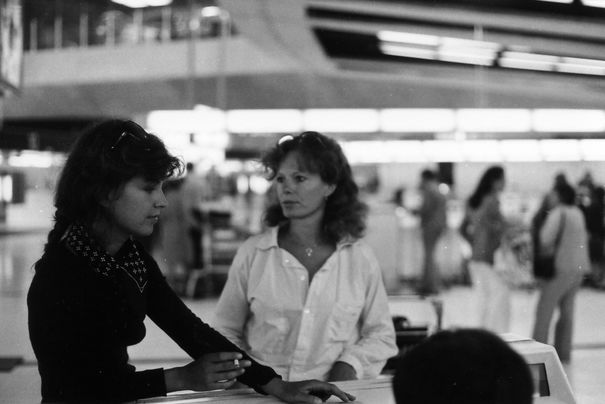Muses of Disobedience
By Andrea Guzmán

© Archives Centre audiovisuel Simone de Beauvoir
Delphine Seyrig may be best known as a Nouvelle Vague acting icon or for her signature role as the subversive housewife-sex worker Jeanne Dielman. Nevertheless, Seyrig was a directress herself, becoming one of the first political video activists from her time through the collaborative work with her friend and one-time teacher, the pioneer feminist documentarian Carole Roussopoulos. This powerful and yet untold story makes DELPHINE ET CAROLE, INSOUMUSES, premiering in the Forum section of this year’s festival, one of the must-sees at the 69th Berlinale.
By exploring the life and work of this creative pair, the young directress Callisto McNulty – granddaughter of Carole Roussopoulos – addresses the feminist movement of the 70s, female collaboration and political possibilities of newly accessible media. Delphine and Carol embraced domestic video techniques as a way of political and creative emancipation; they claimed that women must not just be represented in cinema but take cameras in their own hands. They founded the video collective Les Insoumuses (which means “insoumise” muses) and filmed funny, sharp documentaries that portrayed their generation from a feminist perspective. They also started the Simone de Beauvoir audiovisual centre, archive of feminist media production. They became a pair of true punk legends by traveling through Europe and projecting their material in streets and little local bars.
McNulty avoids heavy rhetoric to explain the context of this historical movement and explores it with a great sense of humour that pays tribute to the films of her grandmother and Seyrig. Here is original footage from The Insoumuses capturing historic movements such as women’s liberation, LGBT protests, discussions about sex work and abortion, and the Black Panthers. Additionally, there is precious footage of radical women of the era: a young Chantal Akerman, Simone de Beauvoir, Marguerite Duras, Agnès Varda, Angela Davis and Valerie Solanas. The film presents a generous archival work that integrates great moments from national television and film history, into loving humorous storytelling about a rebellious friendship and the subversive possibilities of self-produced media and art.

